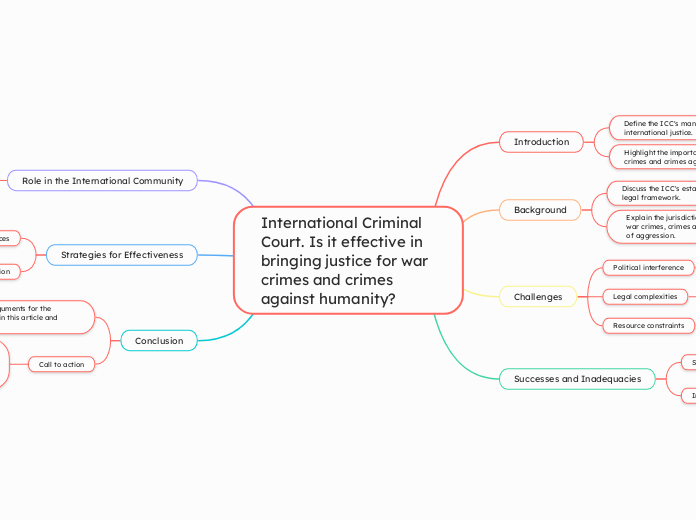International Criminal Court. Is it effective in bringing justice for war crimes and crimes against humanity?
Introduction
Define the ICC's mandate and its role in international justice.
Highlight the importance of accountability for war crimes and crimes against humanity.
Background
Discuss the ICC's establishment in 2002 and its legal framework.
Explain the jurisdiction of the ICC over genocide, war crimes, crimes against humanity, and crimes of aggression.
Challenges
Political interference
Explore instances where political pressure has hindered ICC investigations or prosecutions.
Legal complexities
Detail specific legal challenges the ICC faces in defining and prosecuting international crimes.
Resource constraints
Discuss limitations in funding, staffing, and logistical support for ICC operations.
Successes and Inadequacies
Successes
Highlight significant cases where the ICC has achieved convictions or contributed to justice.
Inadequacies
Critically assess situations where the ICC has faced obstacles in delivering justice or addressing impunity.
Role in the International Community
Impact on accountability norms
Examine how public opinion and media coverage influence the ICC's credibility and effectiveness.
Civil society engagement
Discuss the role of civil society organizations in advocating for ICC investigations and prosecutions.
Strategies for Effectiveness
Specialized task forces
Propose the creation of specialized investigative teams or prosecution units for complex cases.
Enhanced cooperation
Recommend measures to improve cooperation from state parties and non-state actors in ICC proceedings.
Conclusion
Summarize the important arguments for the International Criminal Court in this article and highlight the theme.
Call to action
Further studies or avenues for policy reform are suggested to enhance the effectiveness of the ICC in delivering justice, while we should contribute to the peaceful development of the international community, starting with ourselves.
